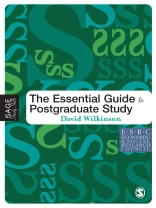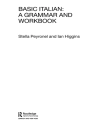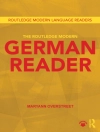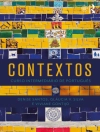To do justice to the postgraduate journey as experienced by the students, quotations and anecdotes from the author′s own research … are drawn upon. These anecdotes provide vivid insights into the postgraduate experience, thereby livening up the text and providing some solace to those facing similar issues in their postgraduate existence′
– Education and Training Journal
For anyone embarking on postgraduate study, this is an indispensable guide. Packed with hands-on advice and examples from students themselves, David Wilkinson provides:
- Up-to-date information on developments in postgraduate study
- Guidance on where and how to apply
- Advice on constructing effective research proposals, with examples of successful submissions
- Help with developing an academic writing style and advice on how to get published.
While each consecutive chapter develops and builds upon its predecessor, the book has been designed to be easy to ′dip into′ to help resolve a problem or examine an issue of relevance to a particular stage of the process.
Detailed yet highly accessible, The Essential Guide to Postgraduate Study is a ′must-have′ resource for prospective postgraduates, current postgraduates and anyone interested in better understanding postgraduate study in UK universities and colleges.
SAGE Study Skills are essential study guides for students of all levels. From how to write great essays and succeeding at university, to writing your undergraduate dissertation and doing postgraduate research, SAGE Study Skills help you get the best from your time at university. Visit the SAGE Study Skills hub for tips, resources and videos on study success!
Table of Content
Why Read this Book?
The Target Audience
Developments in Postgraduate Study
Where to Study and Apply for Funding
Developing Proposals
Finding your Feet
The Culture of Academia
Reading and Searching for Information and Seeking Advice
Managing your Time, Academic Writing and Presenting your Work
Working with your Supervisor
Working with other Researchers
Career Planning
Publishing Opportunities
About the author
David has worked in higher education for over 10 years, teaching on a range of programmes of study – at undergraduate and postgraduate level.
He has been a researcher for a number of years – working with a number of public and private sector organisations – and has undertaken a variety of research projects funded by a variety of sponsors. David began his research and teaching career whilst working towards his Ph D (in 1994) at City University, and regularly contributed to undergraduate and postgraduate teaching programmes – as well as providing development support for web-based and distance learning materials.
In 1997 he moved to the University of Cambridge, Institute of Education and provided research support and administration to a nationally funded project to assess and evaluate the user-friendliness of the Special Educational Needs Code of Practice. In 1998 David progressed to a Research Officer post at the National Foundation for Educational Research (NFER), and worked on a wide range of education-related research projects. From 1999 to present David has been primarily associated with the University of Leeds, working variably as a researcher, programme/materials developer and lecturer.
He has published material relating to various aspects of his work and he is an editorial advisory board member for the journal Practice Development in Healthcare.












